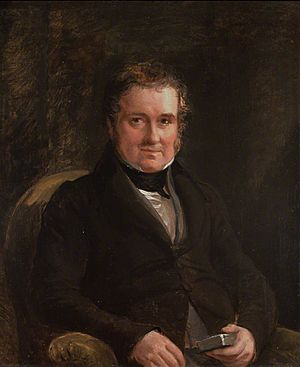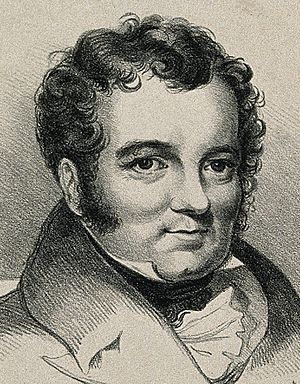Lewis Weston Dillwyn facts for kids
Quick facts for kids
Lewis Weston Dillwyn
|
|
|---|---|
 |
|
| Born | 21 August 1778 Walthamstow, Essex, England
|
| Died | 31 August 1855 (aged 77) Sketty Hall, near Swansea, Wales
|
| Known for | The British Confervae |
| Spouse(s) | Mary Adams |
| Children | Six, including John Dillwyn Llewelyn, Lewis Llewelyn Dillwyn, Mary Dillwyn, Suzanna |
| Parents |
|
| Scientific career | |
| Fields | Porcelain manufacturer, naturalist, Member of Parliament |
| Author abbrev. (botany) | Dillwyn |
Lewis Weston Dillwyn (born August 21, 1778 – died August 31, 1855) was a very important person in Britain. He was known for making beautiful porcelain, studying nature, and being a Whig MP. This means he was part of the government, helping to make laws for the country.
Contents
Life and Work of Lewis Dillwyn
Lewis Weston Dillwyn was born in Walthamstow, England. He was the oldest son of William Dillwyn and Sarah Dillwyn. His father, William, was a Quaker from Pennsylvania, USA. Quakers are a religious group known for their peaceful beliefs.
William Dillwyn moved back to Britain in 1777 during the American War of Independence. He was a strong supporter of ending slavery. He traveled around England and Wales to help the Anti-Slavery Committee.
The Cambrian Pottery
Lewis's father, William, bought the Cambrian Pottery in Swansea, Wales. He bought it to keep Lewis busy, as Lewis was dealing with a health issue called gout. Gout is a type of arthritis that causes joint pain.
Under Lewis's management, the pottery became very famous. They even opened a special store in London in 1806. In 1814, the pottery hired workers from another factory, Nantgarw Pottery. This helped them start making fine porcelain.
A Naturalist and Scientist
Besides making pottery, Lewis Weston Dillwyn was also a well-known naturalist. This means he studied nature, especially plants and animals. He wrote important books about botany (the study of plants) and conchology (the study of shells and mollusks).
One of his most famous books was The British Confervae, published in 1809. This book was a detailed study of freshwater algae found in Britain. Algae are simple plant-like organisms. Lewis Dillwyn discovered several new types of Conferva algae.
Many talented artists helped illustrate his book, including William Jackson Hooker and Ellen Hutchins. In 1804, Lewis was chosen to be a Fellow of the Royal Society. This is a very respected group of scientists.
Public Service and Family Life
In 1817, Lewis Dillwyn took a break from the pottery business. He then became involved in public service. In 1818, he was made High Sheriff of Glamorgan. This was an important local government role.
In 1834, he was elected as a Member of Parliament (MP) for Glamorganshire. This meant he helped make laws for the country. He also bought Sketty Hall near Swansea and became the Mayor of Swansea in 1839.
Lewis Dillwyn helped start the Royal Institution of South Wales. He was also its first President. In 1840, he wrote a short history of Swansea.
He married Mary Adams in 1807. They had six children. Many of his children and grandchildren became famous in their own right. His son, John Dillwyn Llewelyn, was a noted photographer. His son, Lewis Llewelyn Dillwyn, also became an MP for Swansea. His daughter, Mary Dillwyn, was a pioneering female photographer.
His granddaughters included the novelist Amy Dillwyn and the butterfly expert Mary De la Beche Nicholl. His granddaughter, Thereza Dillwyn Llewelyn, was a Welsh astronomer and a pioneer in scientific photography.
Lewis Weston Dillwyn passed away at Sketty Hall in Swansea in 1855.
.
Honours and Discoveries
Lewis Dillwyn's work was so important that several species were named after him.
- Dillwynella is a type of sea snail. These are small marine snails found in the ocean.
- Dillwynia is a group of about 20 types of flowering plants. These plants are found only in Australia.
Taxa Named by Dillwyn
Lewis Dillwyn also named some species himself, including:
- Lithopoma gibberosa, which is another type of sea snail.
See also
- Dillwyn v Llewelyn, a legal case between his sons concerning his estate[[Category:Whig (British political party) MPs for Welsh
constituencies]]
 | Shirley Ann Jackson |
 | Garett Morgan |
 | J. Ernest Wilkins Jr. |
 | Elijah McCoy |


